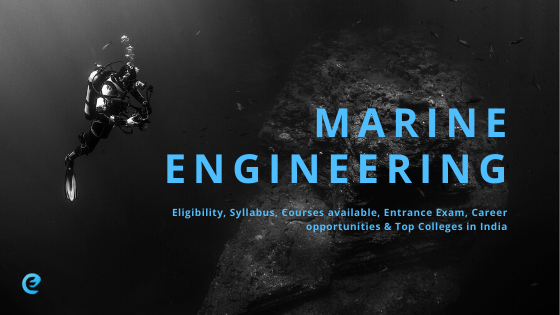What is Marine Engineering?
Marine Engineering is a field of engineering that focuses on the design of the seagoing craft, docks, harbor works, and also the operation of mechanical equipment. A Marine Engineer’s basic job is to design, build, and maintain the vehicles/structures which are used in water.
Marine Engineers work upon several kinds of things, such as ships, oil tankers, fixed or adjustable structures overseas. Marine Engineers recognize the systems of their vessels or installations and develop specific plant designs and system diagrams in order of becoming experienced with the method. It is necessary because if anything gets damaged or broken it is the engineer’s responsibility to fix the problems as soon as possible. Engineers must have clear knowledge about how each machine functions as well as the greatest way to maintain the system functional. A Marine Engineers’ job is vastly improved by modern technology.
Marine Engineers must take up a graduate degree for four-years to work in the field. This is a sector that gives massive job opportunities with off-shore jobs and its significant compensation. The NRI status is amongst the most desirable aspects of the job.
Eligibility for Marine Engineering
For an undergraduate degree, students should have passed in Biology, Chemistry, and Mathematics at the higher secondary examination or their equivalents with an overall 60% aggregate. They should also have obtained a minimum of 50 % marks in English from either Class X or Class XII. For IITs, eligibility in the Joint Entrance is compulsory (J.E.E).
Most Marine Engineering institutes might not have a minimum or maximum age restriction while few may. Some institutes may test candidate’s physical fitness which involves certain characteristics that have to be specifically examined such as constitution, skeletal system, ears, throat, voice, lymphatic system, cardiovascular system, respiratory system, genitourinary system, skin, nervous system, eyesight, and other tests.
For a postgraduate degree, students should have completed 10+2 examinations in a recognized school. Students should also have pursued the BE/B.Tech degree in Mechanical/Marine Engineering from a recognized university with aggregate marks of 50% to 60% in their bachelor studies.
Syllabus for Marine Engineering
Marine Engineering course syllabus at the UG as well as at the PG level is given below.
Marine Engineering: Undergraduate Syllabus
Semester I
- English
- Mathematics-I
- Basic Thermodynamics
- Basic Electrical & Electronics Engineering
- Engineering Mechanics – I
- Workshop Technology
- Geometrical Drawing
- Basic Electrical & Electronics Laboratory
- Workshop Practicals – I
- Communicative English Lab
Semester II
- Seamanship, Elementary Navigation & Survival at Sea
- Mathematics – II
- Applied Thermodynamics – I
- Strength of Materials – I
- Strength of Materials – I
- Computer Science
- Engineering Mechanics – II
- Engineering & Machine Drawing
- Applied Mechanics Laboratory
- Workshop Practicals – II
- Computer Laboratory – I
Semester III
- Computational Mathematics
- Analog Electronics & Communication
- Applied Thermodynamics – II
- Strength of Materials – II
- Mechanics of Machines – I
- Electrical Machines – I
- Marine Engineering Drawing
- Electronics Laboratory
- Heat & Chemical Laboratory
- Workshop Practicals – III
- Control Engineering Laboratory
Semester IV
- Marine Boilers
- Digital Electronics & PLC
- Mechanics of Machines – II
- Electrical Machines – II
- Fluids Mechanics
- Marine Heat Engine & Air Conditioning
- Applied Marine Control & Automation
- Heat & Boiler Chemical Laboratory
- Computer Microprocessor & PLC Laboratory
- Workshop Practicals —IV
Semester V
- Material Science
- Ship Structure & Construction
- Marine Internal Combustion Engine – I
- Fluid Mechanics
- Marine Auxiliary Machines – I
- Naval Architecture – I
- Elementary Design & Drawing
- Material Science Laboratory
- Vibration Laboratory & Fluid Mechanics Laboratory
- Marine Power Plant Operation – I
Semester VI
- Ship Fire Prevention & Control
- Marine Internal Combustion Engine II
- Marine Electrical Technology
- Marine Auxiliary Machines – II
- Naval Architecture – II
- Management of Science & Economics
- Marine Steam Engineering
- Fire Control & Life Saving Appliances Laboratory
- Marine Power Plant Operation —II
- Electrical Machines Laboratory
Semester VII
- Ship Operation & Management
- Advanced Marine Control Engineering & Automation
- IMO – Maritime Conventions & Classification Society
- Advanced Marine Technology
- Engine Room Management
- Elective
- Marine Machinery & System Design
- Simulator & Simulation Laboratory
- Technical Paper & Project
Semester VIII
- ONBOARD TRAINING & ASSESSMENT
- Voyage / Training Report
- Project on Environment & its Project
- Viva – Voce
Marine Engineering: Postgraduate Syllabus
Semester I
- Wind waves and Wave hydrodynamics
- Marine Geotechnical Engineering
- General Oceanography, Estuarine dynamics, and Coastal Engineering
- Computer Laboratory and Marine Structures Laboratory
- Theoretical and Experimental Stress Analysis
Semester II
- Port Planning and Dredging
- Analysis and Design of Marine Structures
- Construction, Planning, Operation and Management of Ports
- Coastal Engineering Laboratory and Marine Geotechnical Laboratory
- Design Project
- Elective I
- Elective II
Semester III & IV
- Thesis work (in the area of specialization)
List of electives:
- Finite Element Method
- Remote Sensing Applications in Coastal Engg.
- Structural Design and Drawing
- Offshore Engineering
- Computer Oriented Numerical Methods
- CAD of Marine Structures
Courses available in Marine Engineering
- Diploma in Marine Engineering
- Bachelor of Engineering in Marine Engineering
- Bachelor of Technology in Marine Engineering
- Bachelor of Technology in Naval Architecture & Ocean Engineering
- Master of Technology in Air Armament
- Master of Engineering in Marine Engineering
- Master of Technology in Marine Engineering
- Master of Technology in Ocean Engineering and Naval Architecture
Entrance Exam for Marine Engineering
Admissions to both UG and PG Marine Engineering are based on entrance exams. However, admissions to certain institutes may be based on merit. This is preceded by Group Discussion, Personal Interview, psychometric test, and medical examination based on the institution to which one is appealing. Several colleges allow direct-entry admission.
The topmost prominent Marine Engineering exams are given below. The syllabus for the exams provided includes Physics, Chemistry, Arithmetic, Logical Reasoning, and English.
- IMU-CET (Indian Maritime University-Common Entrance Test)
- JEE MAIN (Joint entrance examination main)
- CUSAT CAT (Cochin University of Science and Technology)
- GATE is the most popular entrance exam for PG-level marine engineering admissions.
Career opportunities and compensation details after Marine Engineering
Marine Engineering graduates have several possibilities in various fields. Marine Engineers can work in the shipping field and penetrate marine industries at ports. They can further join Ship manufacturing companies, mostly good benefactors. Marine Engineers are employees in the I.T, the shipping industry which is the basis of the industry of the country. Besides the consultancy companies such as Price Waterhouse Coopers and DCL, these sectors are of huge significance. Those who decide to join the Government Service can join India’s Directorate General of Shipments.
Top Ranking Marine Engineering Colleges in India
- Indian Maritime University (IMU), Chennai
- Academy of Maritime Education and Training (AMET), Kanathur, Tamil Nadu
- Maharashtra Academy of Naval Education and Training (MANET), Pune
- International Maritime Institute (IMI), Noida
- Tolani Maritime Institute (TMI), Mumbai
- International Maritime Academy (IMA), Chennai
- Institute of Technology & Marine Engineering (ITME), Kolkata
- Coimbatore Marine College (CMC), Coimbatore
- Vels Academy of Maritime Studies, Chennai
- Samundra Institute of Maritime Studies, Mumbai



